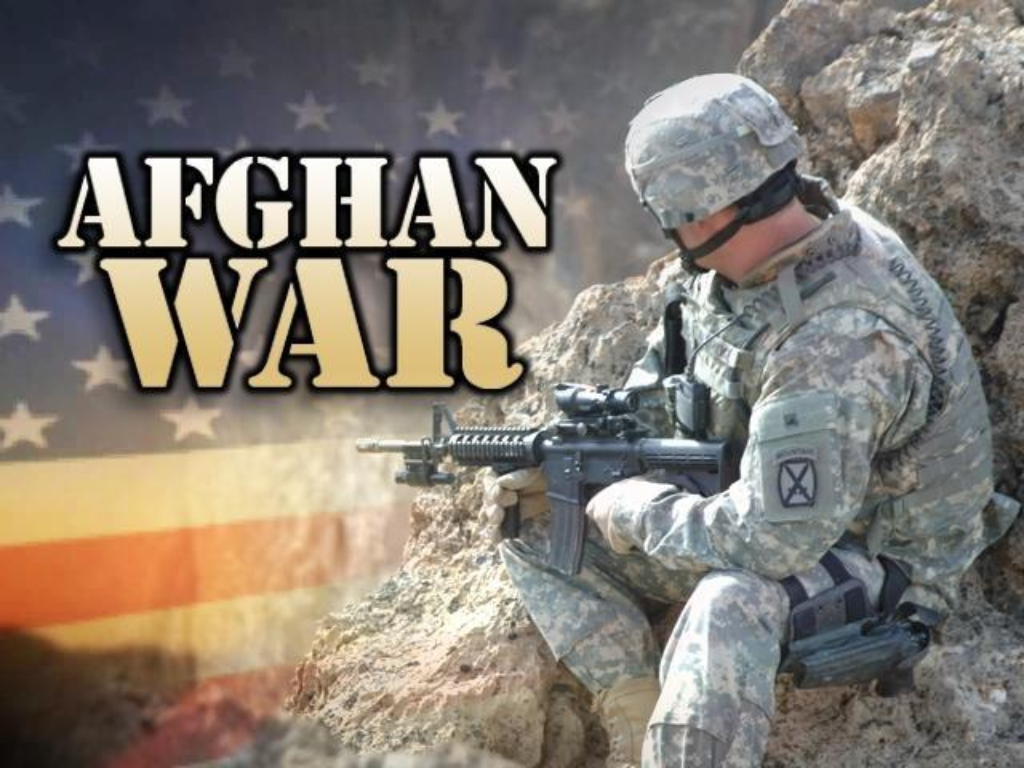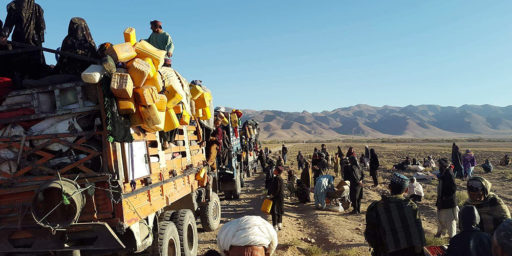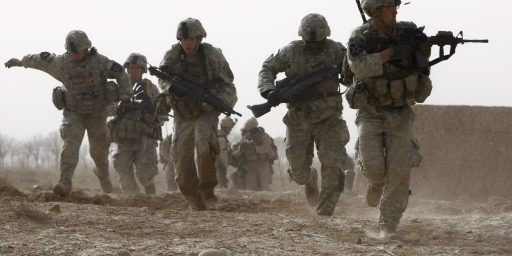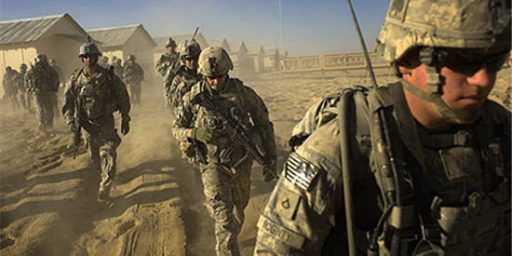U.S. To Withdraw Up To 7,000 Troops From Afghanistan
The Pentagon is being ordered to draw up plans to withdraw roughly one-half of the American forces remaining in Afghanistan. It's about time.

In addition to the announced decision to remove all American ground troops from Syria, President Trump has issued, and the Pentagon is developing plans for, order to withdraw as many as 7,000 troops from Afghanistan:
WASHINGTON — The Trump administration has ordered the military to start withdrawing roughly 7,000 troops from Afghanistan in the coming months, two defense officials said Thursday, an abrupt shift in the 17-year-old war there and a decision that stunned Afghan officials, who said they had not been briefed on the plans.
President Trump made the decision to pull the troops — about half the number the United States has in Afghanistan now — at the same time he decided to pull American forces out of Syria, one official said.
The announcement came hours after Jim Mattis, the secretary of defense, said that he would resign from his position at the end of February after disagreeing with the president over his approach to policy in the Middle East.
The whirlwind of troop withdrawals and the resignation of Mr. Mattis leave a murky picture for what is next in the United States’ longest war, and they come as Afghanistan has been troubled by spasms of violence afflicting the capital, Kabul, and other important areas. The United States has also been conducting talks with representatives of the Taliban, in what officials have described as discussions that could lead to formal talks to end the conflict.
Senior Afghan officials and Western diplomats in Kabul woke up to the shock of the news on Friday morning, and many of them braced for chaos ahead. Several Afghan officials, often in the loop on security planning and decision-making, said they had received no indication in recent days that the Americans would pull troops out. The fear that Mr. Trump might take impulsive actions, however, often loomed in the background of discussions with the United States, they said.
They saw the abrupt decision as a further sign that voices from the ground were lacking in the debate over the war and that with Mr. Mattis’s resignation, Afghanistan had lost one of the last influential voices in Washington who channeled the reality of the conflict into the White House’s deliberations.
The reduction of American forces in Afghanistan, one American official said, is an effort to make Afghan forces more reliant on their own troops and not Western support.
But some fear the move could only imperil the Afghan troops, who have struggled in the field against the Taliban and have suffered high casualty rates, even with the current level of American support.
Cmdr. Rebecca Rebarich, a Pentagon spokeswoman, declined to comment on the plan to remove troops from Afghanistan.
The president long campaigned on bringing troops home, but in 2017, at the request of Mr. Mattis, he begrudgingly pledged an additional 4,000 troops to the Afghan campaign to try to hasten an end to the conflict.
Though Pentagon officials have said the influx of forces — coupled with a more aggressive air campaign — was helping the war effort, Afghan forces continued to take nearly unsustainable levels of casualties and lose ground to the Taliban.
The renewed American effort in 2017 was the first step in ensuring Afghan forces could become more independent without a set timeline for a withdrawal. But with plans to quickly reduce the number of American troops in the country, it is unclear if the Afghans can hold their own against an increasingly aggressive Taliban.
Currently, American airstrikes are at levels not seen since the height of the war, when tens of thousands of American troops were spread throughout the country. That air support, officials say, consists mostly of propping up Afghan troops while they try to hold territory from a resurgent Taliban.
Lt. Gen. Kenneth F. McKenzie Jr. of the Marines, the incoming commander of Central Command, told lawmakers during his confirmation hearings this month that the Afghan military would dissolve if not for American support.
“If we left precipitously right now, I do not believe they would be able to successfully defend their country,” he said. “I don’t know how long it’s going to take. I think that one of the things that would actually provide the most damage to them would be if we put a timeline on it and we said we were going out at a certain point in time.”
Prior to this news, President Trump had continued following the same path laid out by his predecessors and indeed appeared to be prepared to stay in Afghanistan for the long haul. At that time, the President laid out a strategy that sounded a lot like the one that President Obama had followed, namely one in which American forces would remain in the country with the primary mission of training the Afghan Army in its ongoing conflict with the Taliban while at the same time remaining free to conduct anti-terror operations in the country to the extent there were still elements of al Qaeda and ISIS, which had begun making inroads in Afghanistan in the waning years of the Obama Administration.
At this point, there are approximately 14,000 American troops in Afghanistan, and they are supplemented by roughly 8,000 additional troops from NATO and other allied nations. Primarily these troops are involved in training and advising the Afghan army and other forces. Withdrawal of 7,000 troops from the country would represent about half the current commitment and put the number of American troops in the country at their lowest point since March 2002, which of course was just about six months after the war had started in October 2001. In addition to training Afghan forces, the American forces at least are also available for counter-terrorism operations against al Qaeda and ISIS. The troops that would be withdrawn would apparently be made up of troops engaging in both missions.
Not surprisingly, many Trump Administration critics are criticizing this decision in much the same way that is being used to criticize the decision to withdraw from Syria, calling it arbitrary, premature, and likely to lead to problems in the future. Given the seventeen year history of our intervention in Afghanistan, though, it seems to me that we’ve basically got two choices. Either we start withdrawing at some point, or we stay. The second option doesn’t strike me as a workable one given the fact that, eventually we’re likely to learn the same lesson that the British and the Soviets did when they tried to tame the tribes in Afghanistan, namely that Afghanistan is where empires go to die.
This whole war started, of course, as a war to retaliate against al Qaeda for the September 11th attacks and to kill or capture its leaders soon morphed into a war against the former Taliban government and, then, direct involvement in what became a civil war between the government in Kabul and the Taliban, who fought alongside tribes in the north that it was able to either bribe or compel to provide fighters. As the war settled into that pattern, it largely disappeared from the front pages of American news coverage, overtaken instead by reporting from Iraq, which was a much more active combat zone that was far easier for networks to get reporters into. That doesn’t mean the war ended, of course, it continued largely in the shadows and soon earned the title of “America’s forgotten war.”
By 2008, Barack Obama was campaigning on the twin promises of finally ending American involvement in Iraq and stabilizing a situation in Afghanistan that was quickly spinning out of control as the Taliban were able to push back against government forces that proved to be less than adequate. This led to the troop surge of the early part of Obama’s first term and, for a time at least, it appeared that things were finally starting to stabilize in the country to the point where we could start pulling troops out. While the U.S. did begin to bring troops home and, so far at least, has not returned to the troop levels we saw immediately after the surge, things didn’t exactly go well as time went on.
In 2014, President Obama announced an agreement with the Afghan government that would result in a gradual drawdown of American forces and end to the war from the American point of view. , most if not all American troops would be out of the country by the end of 2016, with the possibility left open that a small training force would be left behind. Almost immediately, though, the Obama Administration began pushing back the pace of that withdrawal to the point that it soon became clear that the promise of an end to the war by the end of 2016 was not going to happen. As was the case with the gradual upgrade in American involvement in the war against ISIS, President Obama gradually began slowing down the pace of the American withdrawal and walking back previous promises that we would be direct involvement in the war.
Consider this timeline:
- November 2014 – President Obama announces that American forces would continue to be involved in combat operations.
- March 2015 – President Obama announces that t the pace of withdrawal would be slowed even further on the occasion of a visit from newly elected Afghan President Ashraf Ghani.
- April 2015 – Various news sites report that American forces were involved in more than just the counterterrorism operations that President Obama’s original plan had said they would be limited to.
- October 2015, President Obama announced that the withdrawal of U.S. forces would be halted due to the ongoing threat posed by a resurgent Taliban in several Afghan provinces.
- February 2016 — President Obama announces that that American troops would be deployed back into areas of Afghanistan where active combat was occurring
- In July 2016, President Obama announced that American troops would be deployed back into combat areas in the country, a reversal of previously announced policy that had stated that American forces would largely be restricted to advisory and training roles while the Afghan Army took over direct combat with the Taliban.
- August 2017 – President Trump announces “new” strategy in Afghanistan that will require increasing American troop presence by at least 5,000 troops from its current level of roughly 12,000 personnel.
All of this sounds all too close to a pattern I predicted would unfold:
At this rate, it seem inevitable that we’ll reach a point some time this year when the President will announce, no doubt with frequent use of the word “regretfully” or some similar word, that the previous commitment to remove most American troops by December 31st cannot be met. That announcement will likely come either early in the year or after the election so as to minimize the political impact, but it is the inevitable next step in all of the delays to withdrawal that the Administration has announced over the past fourteen months. More likely than not, the President will simply punt the matter into the future, perhaps by delaying the “official” withdrawal date for six months or so, thus leaving the matter for the next President to decide. All of this will occur contemporaneously with likely future increases in American commitments in Iraq and Syria related to the fight against ISIS, thus leaving quite a lot on the plate for the next President that could very well significantly distract them from being about to carry out any domestic agenda.
That was written in February 2016, and so far I’ve been proven correct.
Quite honestly, this seems like a strategy that was guaranteed to fail. Yes, it’s true that we have ongoing military commitments that have lasted far longer than our involvement in Afghanistan has, but that misses the point. American forces have been in Europe, principally Germany, and the United Kingdom, since the end of World War Two, for example, but they haven’t been involved in anything approaching active combat for seventy-two years now. The same goes for the American forces in Japan, although our bases there did serve in a support role during the Korean War and, to some extent, during the Vietnam War. We’ve had troops in South Korea since the armistice was signed in 1953, but again there hasn’t been anything approaching a combat situation there in sixty-four years. The same is true about commitments elsewhere in the world for the most part. American forces in Afghanistan, though, have been involved in combat in some form or another on a non-stop basis for seventeen years, and that doesn’t even count the activity that may have been engaged in by Special Forces or CIA assets during the Soviet occupation and the years leading up to the September 11th attacks. And it looks like this status will continue to be the case for the foreseeable future. Doesn’t there come a time when we just have to tell the Afghans that we can’t do this anymore and they’re going to have to learn to either resolve their differences through negotiation or handle this civil war on their own?
With the war in Afghanistan set to turn eighteen years old next October, we’re now at the point where the sons and daughters of men who fought in the early years of the war will be old enough to enlist in the military themselves. Many of those who were born before the September 11th attacks or who were too young on September 11th, 2001 to have any living memory of what happened that day already are. This kind of multi-generational war is unlike anything we’ve seen in the past, and clearly can’t be healthy for the nation. Despite that, only a handful of voices in Congress and outside politics are even talking about the need to talk about the end of our involvement in Afghanistan. That pretty much guarantees that this war will continue as long as we’re willing to continue fighting it. Since it’s a war that doesn’t get shown on television very much and thus exists largely outside the consciousness of most Americans, that’s likely to end up being a self-fulfilling prophecy. For all of these reasons, and because there’s likely to never be a “good time” to withdraw from this seemingly never-ending conflict it strikes me that this pullback is coming at the right time. It doesn’t have to happen all at once, of course, and it should not be done in a manner that makes the situation more dangerous, but making plans to get out strikes me as the right thing to do.





Except “we” have never been willing to fight it. From the very beginning when we sent in CIA agents w/ backpacks full of cash to pay off northern alliance warlords until today “we” have been sending other people’s sons and daughters to “fight” there while never once investing the necessary moneys, tools, or strategies it would take to actually “win”.
We never should have gone in and it’s long past time we got out.
Some credit to the Administration for stumbling in the right general direction in Afghanistan and Syria. Heck, I’ll even give them credit for signing the prison reform bill (literally a no-brainer which luckily Trump qualifies for).
In the meantime, the economy is starting to tank while the deficit explodes. What a great combo! Hopefully people remember in 2 years exactly who started this disaster with an ill-advised tax plan and an unprecedented lack of planning and organization.
I agree. We should dump Afghanistan and lick our wounds. No more lives and treasure. There is very little upside. Let someone else get burned. Russia and China can take their turns.
Syria is another area where I agree with Trump. I’m don’t have a problem with the Syria withdrawal. The military/political terrain there is one we don’t understand. There are no good actors to support. In the end, all we’ve done is strengthen Assad, a result which I can live with in an amoral, real politik way.
I was against pulling out of the JPCOA. We had an opportunity to moderate the direction of Iranian ambitions and I believe we blew it. After all, our actions in Iraq strengthened Iran. Now we are strengthening them again.
The problem with our Middle East foreign policy is that it is in the grips of radical right wing Christian fanatics. Until that connection is broken and our foreign policy is there to help the US rather than fanatical religious ideology, we are doomed to spend more lives and treasure.
If we want to really stay in the Middle East, we should plop our armies in Kurdish territory and declare a Kurdish national state. That would upend all the pieces in that chessboard and piss off just about everyone.
If we withdraw, we are likely to end up invading again — the central government isn’t up to the task of keeping the Taliban in check.
Or we will be lobbing a bunch of cruise missiles in every time there is a terrorist attack, training the Taliban and al Qeada folks to duck and setting a price for attacks.
To be clear: there is no “winning” to be had in Afghanistan, either for us, or for anyone else. The Russians failed spectacularly when they tried to win. But a long term stabilization is doable, with us constantly propping it up. And the costs are honestly not that high if we set that as our goal.
If the Taliban were not so bad on human rights, we couldn’t say this, but by propping up the Afghan federal government, we really are helping the human rights situation there too.
I would like to see us draw down our operations a bit, and shift into a purely training role in a few years, at a nice big military base with good security, ready to expand outwards if needed, and working to ensure that we won’t be. But, even that is going to take time.
@Scott: I don’t think Russia or China want to take a turn in Afghanistan. We basically have it in maintenance mode, and disrupting that is going to make things worse.
Syria is a simpler case — Assad is bad, but not the worst actor in the country, and Russia really, really wants to step into that Quagmire. It’s easier to step away, and have some idea of the consequences — a nasty dictatorship that will keep people fed. Less worse than never ending civil war and refugee crisis.
It sucks to be the Kurds, but it has always sucked to be the Kurds. We should be leaving Syria in a more structured and deliberate way so it doesn’t suck so much to be the Kurds, but that’s sadly not an option on the table with Trump.
I can go either way on Afghanistan, GTFO as soon as we can gas up the C-17s, or a minimal prop-up of the invariably corrupt and nasty but not actually evil locals. There’s no good answer, just a choice between bad answers. If there’s an actual winning move here I don’t see it.
Syria is similar in a way. I’m about half convinced that the status quo is actually better than any likely scenario following a US withdrawal, certainly for the Kurds. It really comes down to how many innocent people will die with Option A as opposed to Option B.
There’s a knock-on that worries me as well. Erdogan will slaughter the Kurds, the Kurds will start setting off bombs in Istanbul, Erdogan will use it as a pretext for an even more intense crackdown and in the end the incompatibility between NATO and an Islamist Turkey will be too much. Losing NATO control of the Bosphorus would be very, very bad.
@Scott:
And this would represent a wise use of the lives of other people’s children because? Pissing off everyone as a new policy direction–I thought Trump was already doing that.
Again, as I noted in a post yesterday, I’m as in favor of getting out of Syria, Afghanistan, and just about anywhere else as the next guy–and was in favor of not going to Afghanistan or Iraq in the first place–but we live in Bizarro World now until at least 2020. Even if Trump is doing the right thing by accident, he’s doing it without regard to any advice or consideration of how to do it wisely and effectively. This is the guy for whom the saying “could fk up a sht sandwich” was invented. Still, I offer my guarded hope that he hasn’t fked up again and that parents will be able to welcome their children home in something other than body bags and coffins this time.
I’m all for troop withdrawals but not in the most feckless manner possible that maximizes the loss of international political capital and credibility. Besides, it’s not as we currently have the majority of our army based in those areas. If 2,000 US Special Forces and support troops can prevent hundreds of thousands from being slaughtered and give stability to a region that badly needs it, maybe that’s a good tradeoff.
I bet a withdrawal from the Korean peninsula is next as a “cost-saving” measure. Of course, one of the consequences of that “cost-saving” measure is for Japan and Korea being forced to re-arm themselves in the face of NK, Russian and Chinese aggression.
If you want a world where America is not the world’s policeman…just be ready for a world with no police.
I keep saying the US needs a president who is either experienced or talented in foreign policy. The last one was Bush the elder, and he did reasonably well with very tough and unprecedented challenges.
Bush the younger was inexperienced and far from talented. His advisers were uniformly hawkish, overly ambitious, and overly willing to try to realize their ambitions on the cheap.
Obama was better, and had better advisers, but he managed to repeat, on a smaller scale, some of W’s mistakes (such as Libya and Syria). He did very well on the TPP and the Iran Deal, and it’s not his fault at all that El Cheeto wnet and crapped all over them.
Hillary is a hawk, no question, but at least she had experience. unfortunately, she lost.
I don’t know any feasible presidential candidate who fits the bill. Though experience doesn’t mean talent. Reagan had little experience, but overall good advisers, and a knack for it.
@Just nutha ignint cracker: No, actually, that thought was relatively facetious. I think there is no good answer to the ME. I do think, however, that the Kurds may have some semblance of moral authority that should be rewarded. Plus, they are relatively secular and I think religion in all its malevalent forms is the core problem.
@Michael Reynolds: Erdogan was really not expecting Trump to say “ok, go kill some Kurds, we’ll get out of the way.” Erdogan just wanted some token of something.
But, Trump wants Erdogan to shut up about the journalist murdered in the Saudi consulate.
After reading of the phone call, I am less sure about withdrawal. Maybe we should leave a token number of troops there as a buffer between the Kurds and the Turks.
It’s an ugly quagmire. I’m happy to cede that quagmire to the Russians, but I would really like some assurances for the Kurds.
I would happily allocate $5B to build a beautiful slatted fence along the Turkey/Syria border.
@Kathy: Libya and Syria are opposite sides of the same coin — we got involved in Libya, and it was a complete clusterfvck, while we avoided getting involved in Syria until after it became a complete clusterfvck.
I don’t think either of them had a good answer, no matter how experienced or talented the President was. Our power is ultimately limited.
Libya was worse, because we had made a deal with Gadaffi that we broke, making it harder for us to deal with other dictators. That was probably the worst foreign policy mistake since the invasion of Iraq, and the second worst in decades.
@Scott:
I have sympathy for the Kurds. Not sure about moral authority, but the right of self determination is prominent. I have to take exception to “religion in all its malevolent forms is the core problem” though.
As an atheist, I take note of the fact that religion is a construct of man. As such, religion is neither good nor malevolent. Which form it takes, is entirely dependent upon the person who wields it.
@Lit3Bolt: Somebody will step in to be “the police” because nature abhors a vacuum. I would guess Russia will step in to the roll. Putin would like to be “the big guy” anyway. At least he’ll try for it.
@Scott: My apologies. I didn’t catch the sarcasm font.
(…)
This! And thank you for noting it. The same theory works for political theories, too.
Our interest in Afghanistan is preventing them from being a state sponsor of terror attacks against us. Going in was fine. Staying in to try to create democracy is not. If they want to become a radical theocracy, that’s their problem. As long as they don’t harbor terrorists who attack us (see, e.g., Saudi Arabia … oh wait).
Wait, what? We were at war?
Huh, could have fooled me. Bush told us all to go shopping, I guess.
@Kathy: President Reagan seemed to want to avoid getting into brushfire wars in crazy places (Eisenhower warned against it). He pulled the Marines out after the Lebanon disaster. I know a Marine who lost some friends in that one. What were we doing in there? That is the question that I wonder about in Afghanistan. And Syria.
“What is our goal? What is the plan to win? What is the exit plan?” essential questions no one seems to ask. Looks like Congress would have learned from Vietnam.